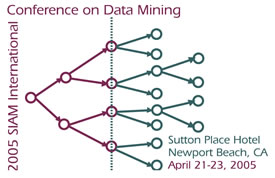
A Sequential Monte Carlo Method for Bayesian Analysis of Massive Datasets
Greg Ridgeway
The Rand Corporation
Markov chain Monte Carlo (MCMC) techniques revolutionized statistical
practice in the 1990s by providing an essential toolkit for making the
rigor and flexibility of Bayesian analysis computationally practical. At
the same time the increasing prevalence of massive datasets and the
expansion of the field of data mining has created the need for
statistically sound methods that scale to these large problems. Except
for the most trivial examples, current MCMC methods require a complete
scan of the dataset for each iteration eliminating their candidacy as
feasible data mining techniques.
We present a method for making Bayesian analysis of massive datasets computationally feasible. The algorithm simulates from a posterior distribution that conditions on a smaller, more manageable portion of the dataset. The remainder of the dataset may be incorporated by reweighting the initial draws using importance sampling. Computation of the importance weights requires a single scan of the remaining observations. While importance sampling increases efficiency in data access, it comes at the expense of estimation efficiency. A simple modification, based on the rejuvenation step used in particle filters for dynamic systems models, sidesteps the loss of efficiency with only a slight increase in the number of data accesses.
Examples demonstrating proof-of-concept show more than a 98% reduction in the number of data accesses over the standard implementation of the Metropolis-Hastings algorithm.